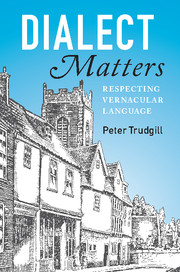Book contents
- Frontmatter
- Dedication
- Epigraph
- Contents
- Foreword
- Acknowledgements
- Map
- Themes
- 1 History: how things came to be this way
- 2 Prescriptivism and other useless pastimes
- 3 Language change: observing and accepting it
- 4 What is happening to words?
- 5 Languages and dialects in contact and conflict
- 6 Respecting English grammar
- 7 Respecting ordinary language
- 8 Sounds and fury
- 9 Respecting local speech
- 10 Grammar: the wonder of it all
- 11 More about words
- 12 Origins
- 13 Accent rules
- 14 Respecting names
- Postscript
- Index
Postscript
Published online by Cambridge University Press: 05 August 2016
- Frontmatter
- Dedication
- Epigraph
- Contents
- Foreword
- Acknowledgements
- Map
- Themes
- 1 History: how things came to be this way
- 2 Prescriptivism and other useless pastimes
- 3 Language change: observing and accepting it
- 4 What is happening to words?
- 5 Languages and dialects in contact and conflict
- 6 Respecting English grammar
- 7 Respecting ordinary language
- 8 Sounds and fury
- 9 Respecting local speech
- 10 Grammar: the wonder of it all
- 11 More about words
- 12 Origins
- 13 Accent rules
- 14 Respecting names
- Postscript
- Index
Summary
This is the column which was published in the Eastern Daily Press on 23 June 2012, in response to an anti-Norfolk dialect column which had been published the previous week. It was to lead to further, shorter contributions on dialect matters which evolved into my weekly column.
It is amazing how often people who do not know anything at all about language still feel free to pontificate about it in public. Language professionals like me – I have been a university teacher of linguistics for forty years – are constantly being surprised by these pontificators – people like Ken Hurst. But Ken's column – where he tells Norfolk people that “the sooner we give up this dialect the better it will be” – is a particularly surprising example.
And not just surprising. Telling Norfolk people how we ought to speak seems like arrogance to me, especially when you start from a position of profound linguistic ignorance. And when I say ignorance, I do mean ignorance. Look at what Ken says: “There's an argument to be had”, he reckons, about accent and dialect. No there isn't! Any first-year linguistics student will tell you that accent is about pronunciation, while dialect is about grammar and vocabulary as well as pronunciation. There is nothing to argue about.
And “you see”, Ken writes patronisingly, “regional dialects are a bit yesterday”. No, they are not. And never will be. Dialects do change through time, but it is not true that “the day of regional dialects is done”. Even if you started with a total absence of regionally distinctive speech, dialects would develop – this is happening in Australia right now. Everybody in the world gives away some information about their regional origins as soon as they start speaking. It is true that there is a very small group of people in this country – people educated at Eton and the other public schools, including the ones who are running the country at the moment – who do not betray anything about their origins except that they are from England and upper class, but this is very unusual on a worldwide scale.
Ken also seems to think that “regional speech serves to accentuate narrow economic horizons”. You are wrong again, Ken.
- Type
- Chapter
- Information
- Dialect MattersRespecting Vernacular Language, pp. 215 - 216Publisher: Cambridge University PressPrint publication year: 2016



